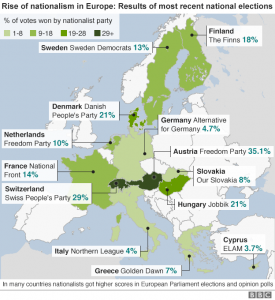Lessons from Trump-triumph

When US citizens voted to elect non-political figure Donald Trump to rule them at least for next four years, Americans themselves and the world reacted with shock and disbelief – what a hell is this. Anyone hardly believe that silent majority in sparse land, who otherwise were neglected, came out active to revolt against the status quo of the Washington politics.
However, this was not a surprise. The was part of the wave running across the world. Americans highlighted how the wave of Spring Revolution, they instigated, swept the Arab world and the middle east ending the decade long individual rules. Back in their own home, they understated impact of this wave.
If you look at the events within political spectrum across the globe in the last few years, the landscape has changed drastically. Possibly, this is the first time since the demise of ultra-communism that liberal democracy in on defensive. The moderate consensus built in post WW2 appears to be on strain.
Nationalism
Nationalism and ethnic politics have become stronger across Atlantic. Despite warnings from whole of Europe, Austrians overwhelmingly voted for a far-right candidate of the Austrian Freedom Party allowing the first right-wing populist to become head of state since WW2, though it has been annulled rescheduled for December 4.
During the European election, the anti-establishment parties challenged strongly the traditional forces of the continental politics. Despite the power remain in the grip of the traditional forces, they were shaken by those who were rather unaccounted in the politics.
In the Netherlands, the populist politician Geert Wilders topped the polls but stumbled in the general election. Traditional forces of the Wilders failed to win the Dutch general election.
In France, the new force National Front performed strongly in the recent regional elections. Its candidate Marine Le Pen is likely to outcast the mainstream political parties when presidential elections are held next year. In Hungary and Poland, there are now parties in power prepared to challenge the European consensus and politics as usual.
In India, nationalist Narendra Modi swept the federal election while Arvind Kejriwal received clean chit in New Delhi.
In UK, the long-time political stalwarts rallied in favour of UK remaining EU member. However, barely known Nigel’s campaign to leave EU got public endorsement.
The influx of refugees from Syria and other conflict ridden Middle East have divided Europe. Many countries are hesitant to accept these refugees. Tensions are high and fears of further escalations continue. The refugee influx has heightened the nationalism and anti-foreigner forces across Europe except in a few countries.
Status Quo
The traditional forces failed to address the public demand. The 2008 crash is not yet over – financial instability continues to widen. Growing unemployment and widening rich-poor gap is fuelling the mass to go anti-establishment.
The old parties and their leaders have consumed most of their time on room-diplomacy, usual rhetoric and conventional governance. We have lived under their guidance for last two-three decades. The only result was the economic turbulence, political instability and widening gap between rich and poor. While those who define themselves of the middle class is shrinking, the population with low income is frighteningly increasingly.
One estimate puts, 52 percent of the profit in last decades ended into accounts of the 1 percent population of the world. This has infuriated the bigger population that change is necessary.
The usual faces in the politics have failed to nail this growing discontent. The anti-establishment forces coming from outside the traditional political elites are basking on this discontent.
Future
The Trump-triumph will have bigger impact on global politics. The impact is likely to be even worrisome for European elites because of the closer political, social and cultural links between these continents. Political earthquake rattling the West threatens liberal democratic leaders and their political future in Europe.
In Italy, A constitutional reform referendum looms on 4 December to reduce the power of senate and local government making the central government even powerful thereby concentrating power in fewer people.
On the same day Austrians are very likely to see far right candidate Norbert Hofer to be their head of state. He was defeated by only 1% in May election which was then annulled.
Popularity of anti-Islam Dutch politician Geert Wilders continues to grow. It will not be a surprise if his party gets election in March election next year.
“I will give the Netherlands back to the Dutch,” Mr Wilders said. That echoed the successful “take back control” slogan of the Brexit camp in the UK’s 23 June referendum, which set the UK on course to leave the EU.
Anti-immigrant National Front (FN) leader Marine Le Pen is shaking up French politics and is widely expected to get through to the second round of the presidential election in May next year and is likely to surge as powerful forces in parliamentary election set for June.
In Australia, be prepared not to be surprised if Pauline Hanson’s One Nation Party received the bigger share of votes in the upcoming elections.
The public discontent will widen its wings and future of the current political elite is on razor edge unless they change the way they rule, they act and they say.